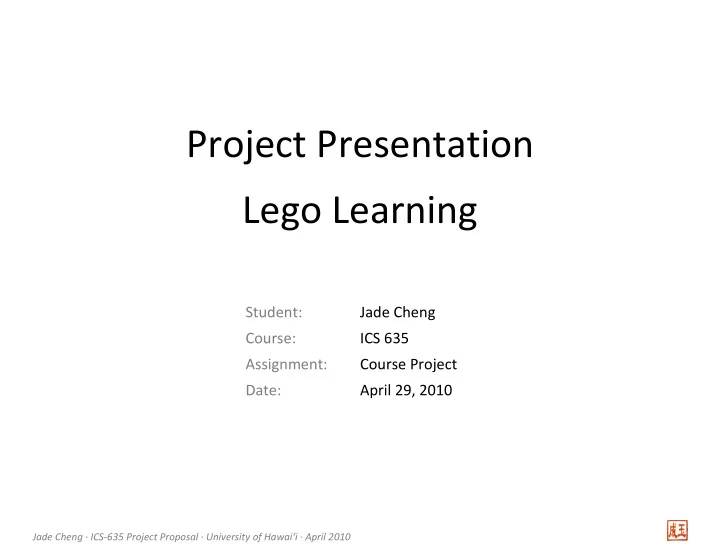

Project Presentation Lego Learning Student: Jade Cheng Course: ICS 635 Assignment: Course Project Date: April 29, 2010 Jade Cheng · ICS-635 Project Proposal · University of Hawai‘i · April 2010
Problem and Goal Problem Autonomous robots need to learn to navigate unstructured environments with limited sensor and motor capabilities. Goal Given a foreign environment, the robot is able to construct a map of its surroundings and localize itself in the environment. Jade Cheng · ICS-635 Project Proposal · University of Hawai‘i · April 2010
Techniques Simultaneous Localization and Mapping (SLAM) Localization Process Where am I? Mapping Process What does the world look like? Techniques Mapping Geometric map rather than topological map Sensing 2D-sweeping with noise in measurements Locating Relative coordinates with motion awareness Modeling Metric grid map with cloud of probability Jade Cheng · ICS-635 Project Proposal · University of Hawai‘i · April 2010
Technical Difficulties Chicken or egg problem An unbiased map is needed for localization. An accurate position estimate is needed to build that map. Inherent uncertainties The measured distance/direction has a budget of inaccuracies. Any feature added to the map contains corresponding errors. Errors build cumulatively over time and with motion. ���������������� � ���������� ������������������ � ����������� Jade Cheng · ICS-635 Project Proposal · University of Hawai‘i · April 2010
Proposed Solutions Technique #1: Feature Recognition (not used for this project) Remember landmarks that are encountered previously. Re-skew new measurements to match. Technique #2: Statistical Filtering (used for this project) Maintain a weighted grid graph. Each node keeps a probability average of the obstacle certainty. Over time, knowledge of obstacle presence is accumulated. ���������������� � ���������� ������������������ � ����������� Jade Cheng · ICS-635 Project Proposal · University of Hawai‘i · April 2010
Robot Hardware Ultrasonic sensor test Accurate within 2 cm Deteriorates over distance ~4000 measurements per second False negatives occur Jade Cheng · ICS-635 Project Proposal · University of Hawai‘i · April 2010
Robot Hardware Touch sensor test Gentle pressure is needed Fast response time Reports pressed and released Jade Cheng · ICS-635 Project Proposal · University of Hawai‘i · April 2010
Communication Capability Latency test One-byte ping-pong test Approximately 50 – 70 ms round trip Jade Cheng · ICS-635 Project Proposal · University of Hawai‘i · April 2010
Communication Capability Bandwidth test Experimentally discovered maximum buffer size for communication Approximately 16,000-byte limit Approximately 8,000 bytes per second Jade Cheng · ICS-635 Project Proposal · University of Hawai‘i · April 2010
Design Separation of Functionality Robot hardware Raw data collection and transmission Software algorithm SLAM and data visualization Software Design Robot simulation Debugging, quickly test end cases, save battery life, etc. Data Visualization Real time updates, chassis location, sensor rotation, grid condition, etc. Jade Cheng · ICS-635 Project Proposal · University of Hawai‘i · April 2010
Implementation and Results Simulated Map: Bitmap input to the program Application Window 5 seconds of execution 30 minutes of execution Jade Cheng · ICS-635 Project Proposal · University of Hawai‘i · April 2010
Recommend
More recommend